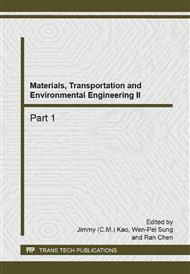p.616
p.620
p.624
p.629
p.634
p.641
p.648
p.653
p.657
The Analysis of Resources Environmental Effects of Rural Industrialized Areas Based on Ecological Footprint
Abstract:
The rapid growth of rural industry has resulted in increased financial well-being, with improvement of farmers’ salaries and development of urbanization. However, it has also contributed to decreased environmental quality and heavy consumption of resources, which were seriously threatening the sustainable economic and social development of China. Little, if any, related research has been published and few of these articles approach the topic from a rural perspective. Systematic evaluation system is lack of study. This paper tries to establish environmental effects assessment model for the ecological footprint of rural industry based on traditional footprint theory, then takes Jimo of Shandong Province and Zhuji of Zhejiang Province for instance to analyze environmental effects of rural industry. The results shows that the resources environmental effects of both regions are different and the ecological footprint per capita of both regions had increased from 2000 to 2009. The upward trend of Zhuji is more obvious and the industrial footprint per capita of Jimo is lower than Zhuji with the gap increasing in the decades. The treatment efficiency of industrial waste of Jimo is higher than that of Zhuji. The population of both regions are close, but the gap of industrial ecological footprint between them are expanding. The GDP ecological footprint of Zhuji was higher than that of Jimo, which means the rural industry of Zhuji put more pressure on the environment.
Info:
Periodical:
Pages:
634-640
Citation:
Online since:
September 2014
Authors:
Price:
Сopyright:
© 2014 Trans Tech Publications Ltd. All Rights Reserved
Share:
Citation:


